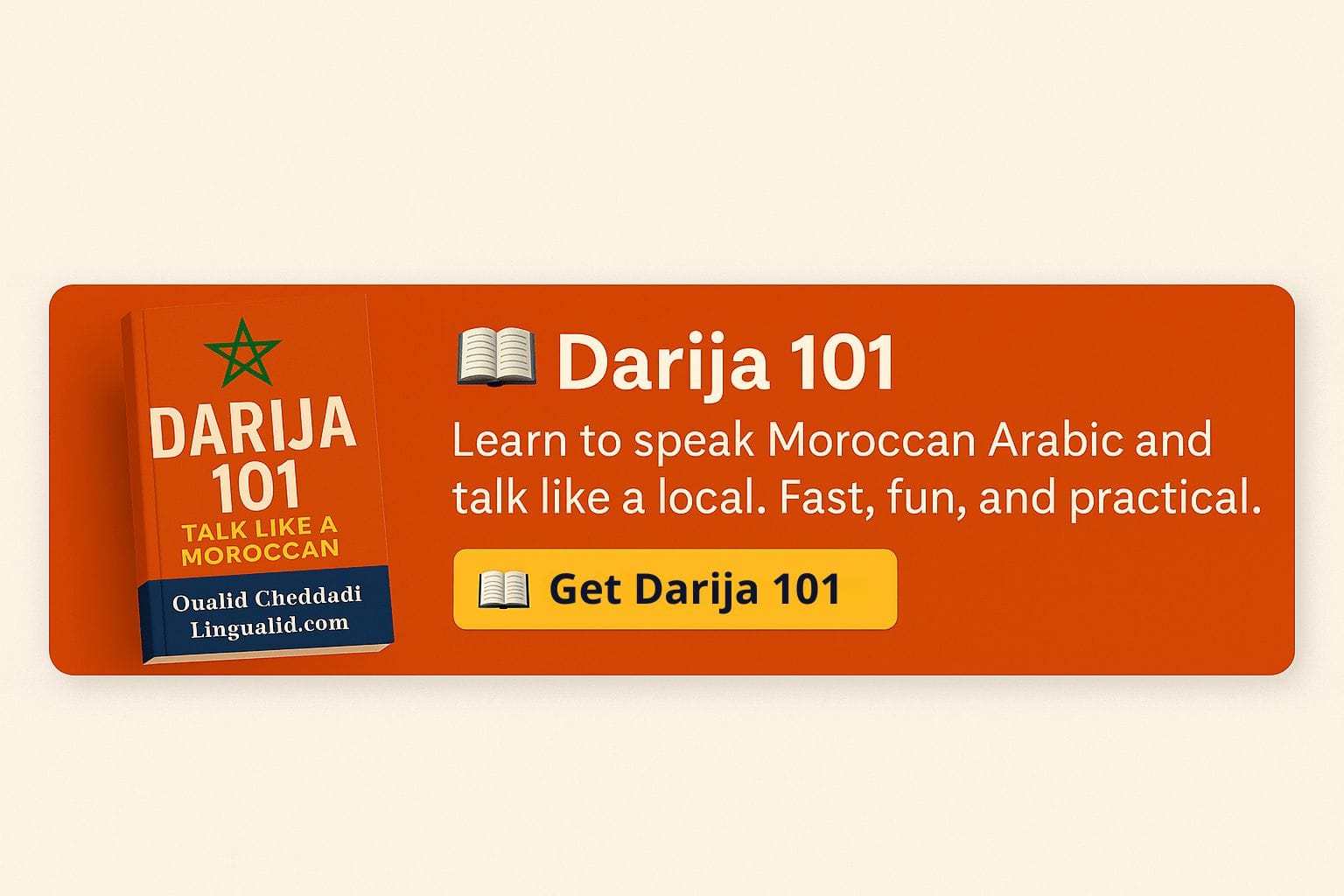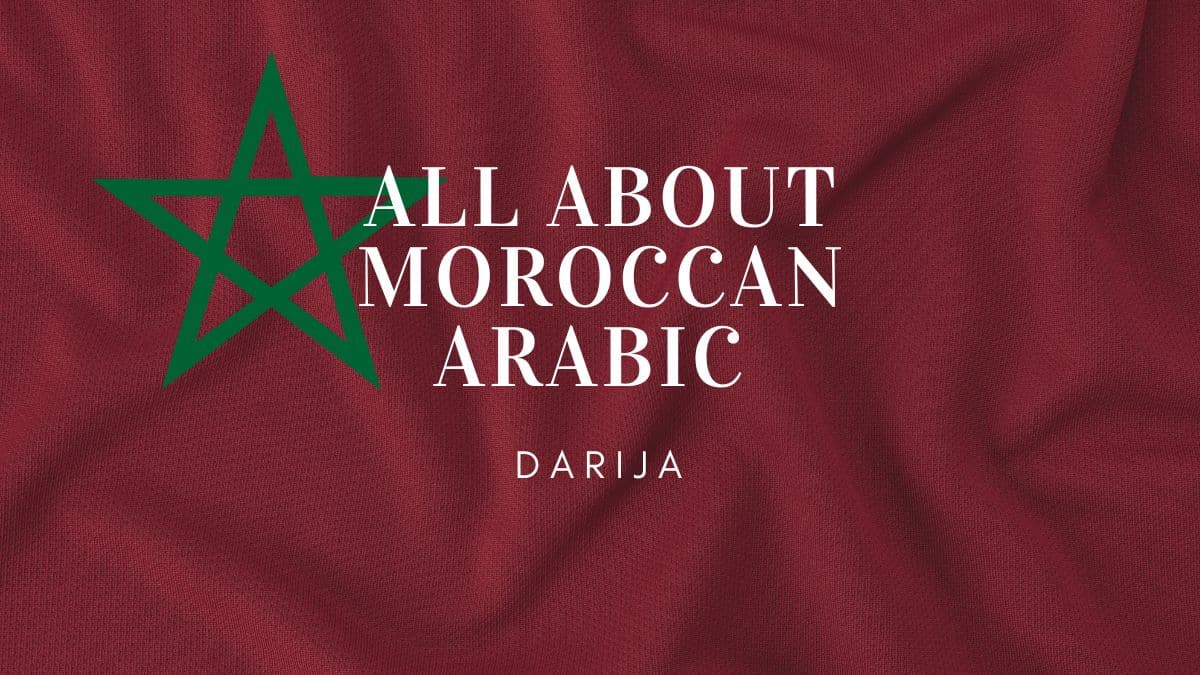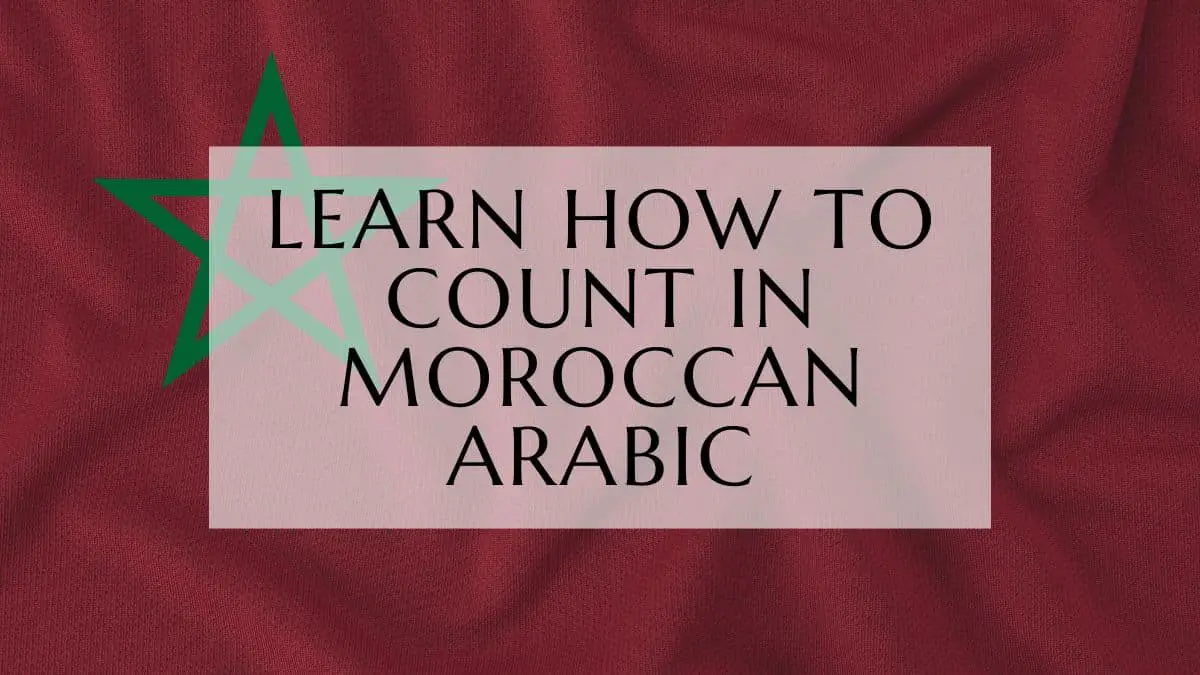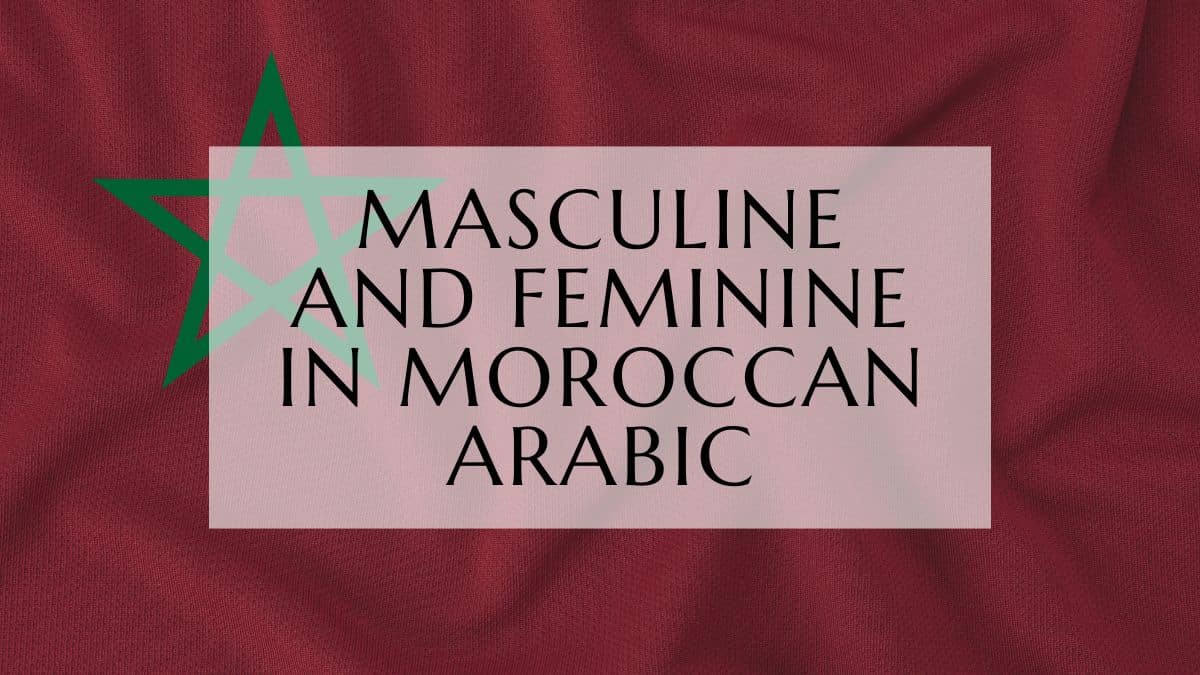Expressing possession in Moroccan Arabic is a skill that you will carry with you in your everyday situations, that’s why it’s a necessity to learn it, the good news is it’s simple and this lesson will prove you just that.
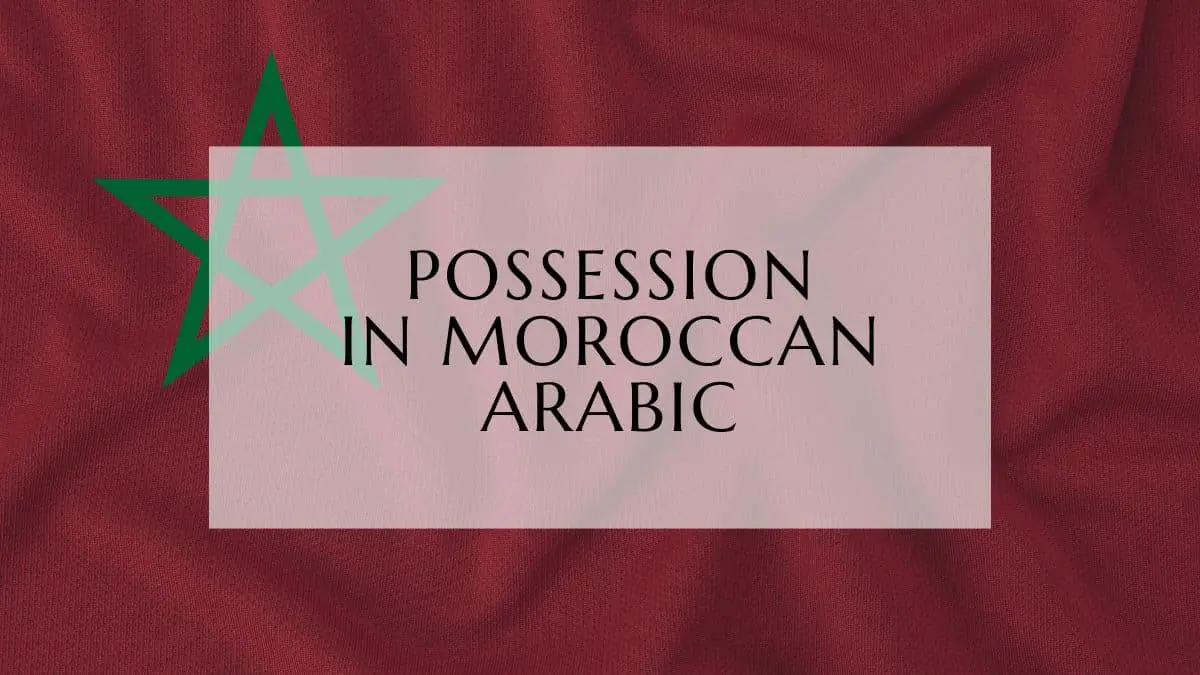
There are two ways to express possession in Moroccan Arabic: adding the word “Dyal” (or its synonyms) or adding possessive suffixes.
Expressing Possession With The Word “Dyal” (and its synonyms)
Take a look at this sentence: hadi tefaha dyal Oualid, (this is the apple of Oualid) dyal here is the equivalent of of in English, what if we want to say “my apple, his apple” for example?:
| English | Transcribed Moroccan Arabic | Using Arabic Alphabet |
| My/Mine | Dyali | ديالي |
| Your/Yours | Dyalk | ديالك |
| His/His | Dyalo | ديالو |
| Her/Hers | Dyalha | ديالها |
| Our/Ours | Dyalna | ديالنا |
| Your/Yours (plural) | Dyalkum | ديالكم |
| Their/Theirs | Dyalhum | ديالهم |
Example: ktab (book):
| English | Transcribelktab d Moroccan Arabic | Using Arabic Alphabet |
| My book | lktab dyali | الكتاب ديالي |
| Your book | lktab dyalk | الكتاب ديالك |
| His book | lktab dyalo | الكتاب ديالو |
| Her book | lktab dyalha | الكتاب ديالها |
| Our book | lktab dyalna | الكتاب ديالنا |
| Your book (plural) | lktab dyalkum | الكتاب ديالكم |
| Their book | lktab dyalhum | الكتاب ديالهم |
Notice that the noun used with “dyal” is always used with the definite article.
Expressing Possession With The Possessive Suffixes
The Possessive Suffixes In Moroccan Arabic:
| English | Transcribed Moroccan Arabic | Using Arabic Alphabet |
| My | -i | -ي |
| Your | -k | -ك |
| His | -o | -و |
| Her | -ha | -ها |
| Our | -na | -نا |
| Your (plural) | -kum | -كم |
| Their | -hum | -هم |
Examples:
Ktab:
| English | Transcribed Moroccan Arabic | Using Arabic Alphabet |
| My | ktabi | كتابي |
| Your | ktabk | كتابك |
| His | ktabo | كتابو |
| Her | ktabha | كتابها |
| Our | ktabna | كتابنا |
| Your (plural) | ktabkum | كتابكم |
| Their | ktabhum | كتابهم |
Tefaha:
As almost every word that has “a” at the end, Tefaha/تفاحة is a feminine word, that “a” at the end is the Arabic “taa marbota” that comes at the end of the feminine words as we talked about here. With that being said, adding the possessive suffix will require transforming that “a” to its origin “t” :
| English | Transcribed Moroccan Arabic | Using Arabic Alphabet |
| My | tefahti | تفاحتي |
| Your | tefahtk | تفاحتك |
| His | tefahto | تفاحتو |
| Her | tefahtha | تفاحتها |
| Our | tefahtna | تفاحتنا |
| Your (plural) | tefahtkum | تفاحتكم |
| Their | tefahthum | تفاحتهم |
Note: you can practice what you’ve learned here, and learn how to pronounce each of the words in our Memrise course here, don’t know how to use the platform or sign up? we’ve got you covered in this easy-to-follow tutorial here.
Moroccan Arabic Possession Study Guide
Quiz
Instructions: Answer the following questions in 2-3 sentences each.
- What are the two ways to express possession in Moroccan Arabic?
- Provide the Moroccan Arabic equivalents for “my,” “your (singular),” and “their” using the word “dyal.”
- How does the use of “dyal” impact the noun it modifies?
- What are the possessive suffixes for “my,” “his,” and “our” in Moroccan Arabic?
- How would you say “your book” in Moroccan Arabic using a possessive suffix?
- What is the significance of the “a” at the end of a noun like “tefaha”?
- What happens to the final “a” of a feminine noun when adding a possessive suffix?
- Give an example of how to say “my apple” in Moroccan Arabic using a possessive suffix.
- What is the English translation of “ktabhum”?
- What is the English translation of “tefahtna”?
Answer Key
- The two ways to express possession in Moroccan Arabic are by using the word “Dyal” (and its synonyms) or by adding possessive suffixes.
- “My” is “dyali,” “your (singular)” is “dyalk,” and “their” is “dyalhum.”
- The noun used with “dyal” always takes the definite article.
- The possessive suffixes for “my” is “-i,” “his” is “-o,” and “our” is “-na.”
- “Your book” using a possessive suffix is “ktabk.”
- The “a” at the end of a noun like “tefaha” signifies that it is a feminine noun. It represents the “taa marbota.”
- The final “a” of a feminine noun transforms into a “t” before adding a possessive suffix.
- “My apple” using a possessive suffix is “tefahti.”
- “Ktabhum” translates to “their book.”
- “Tefahtna” translates to “our apple.”
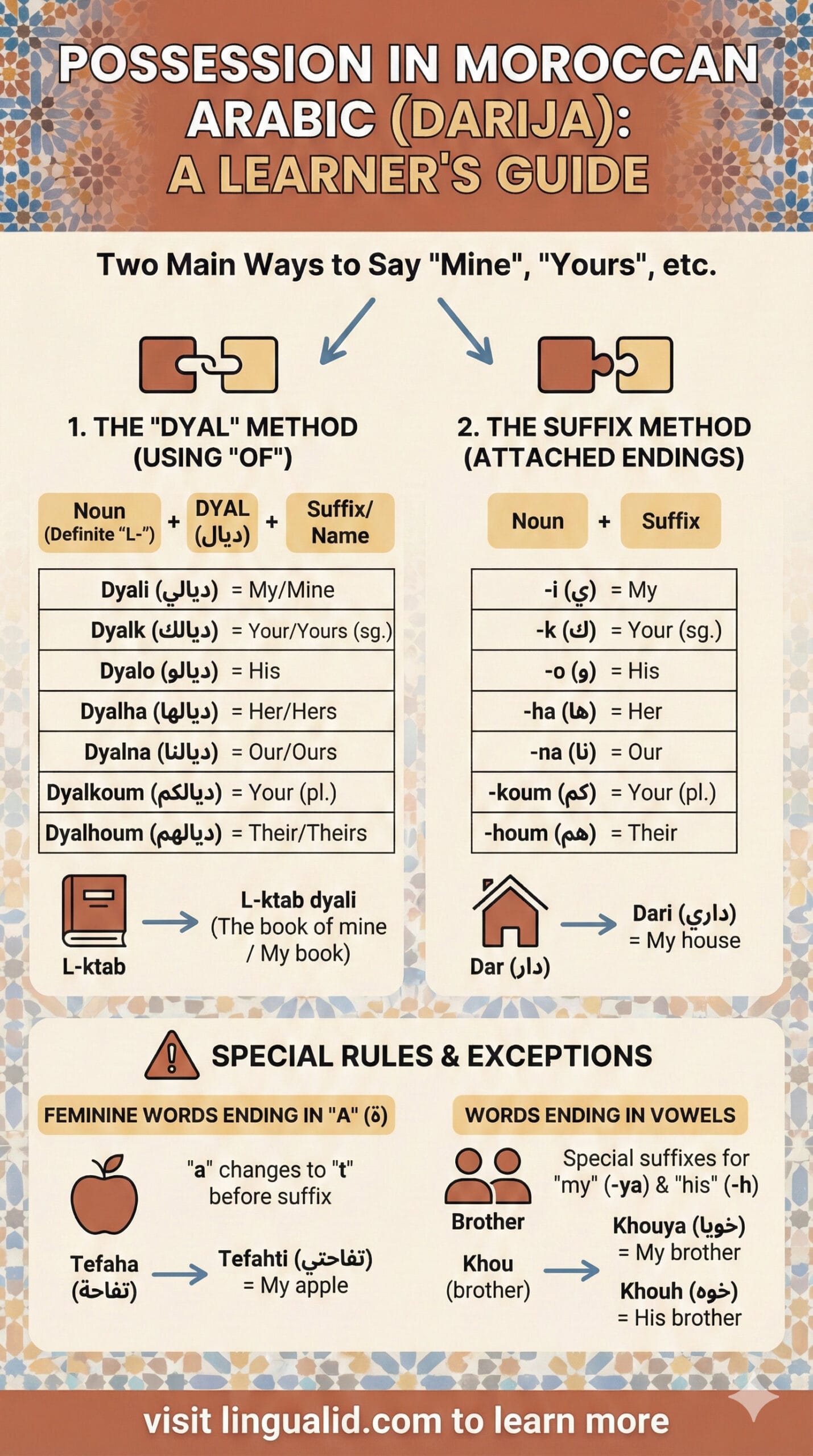
Happy learning
Oualid Cheddadi is the founder of Lingualid, a platform that inspires independent language learners worldwide, regardless of the language they are learning. The name “Lingualid” is derived from the Portuguese word for “language,” “língua,” and the last three letters of Oualid’s name, “Lid.”

